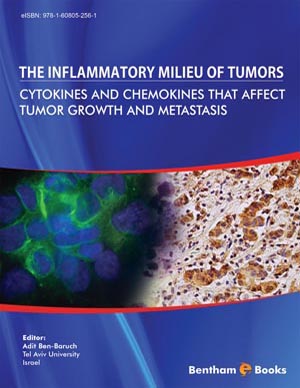Abstract
Clinical and epidemiologic studies have suggested an association between chronic inflammation and cancer development and have estimated that chronic inflammation accounts for 25% of malignancies worldwide [1-6]. However, the molecular and cellular mechanisms linking chronic inflammation to tumorigenesis remain largely unresolved. Tumor outgrowth and progression are multifactorial and complex processes which are dependent on the ability of the transformed tumor cells to organize their microenvironment. Similarly to every normal tissue, the tumor tissue is an organized, albeit abnormal structure that will support the growth of “functional cells,” i.e., tumor cells. Unlike normal tissue, the tumor cells and tissues are not functional and do not contribute to the well-being of the organism. In fact, the novel tumor tissue will damage other tissues and will spread to various functional microenvironments eventually leading to the collapse of the entire organism. Tumor cells are powerful tissue organizers capable of controlling and organizing multiple cell types, such as fibroblasts, vasculature cells (endothelial cells, pericytes and smooth muscle cells), and immune cells (lymphocytes, macrophages, dendritic cells, mast cells and neutrophils), to support their survival, outgrowth, and metastasis. The interactions of cancer cells with components of their tumor microenvironment are bidirectional and are crucial for cancer progression [7-9]. Metastasis of tumor cells is the major source of morbidity and mortality associated with cancer in humans. Metastasis is a complex process that requires the detachment of tumor cells from the primary lesion, invasion into vascular or lymphatic vessels or bloodstream, trafficking and homing of tumor cells to destination organs and finally survival and outgrowth of metastasized cells in their new microenvironment [10, 11]. Due to its multifactorial nature, metastasis formation is a rare event critically dependent on the interaction between a specific target organ and the arriving tumor cells [12]. In order to organize their microenvironment, tumor cells communicate with their surrounding microenvironment via a network of secreted growth factors, cytokines, and chemokines [13, 14]. These players are critical for the development, outgrowth, and progression of tumor cells. Therefore, gaining an understanding and control on their production, communication network and function keeps great promise for the development of novel and specific preventive and therapeutic treatments for cancer. In this review, we will summarize current knowledge, therapeutic approach and drugs in development.
Keywords: Chronic inflammation, cytokines, chemokines, CXCR4, cancer.






















